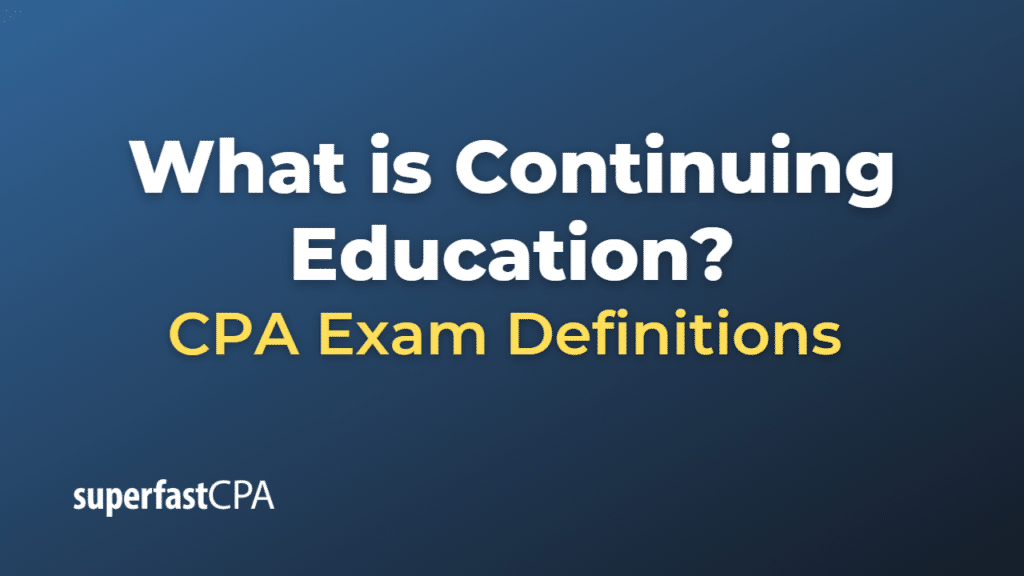Continuing Education
Continuing education refers to the process of pursuing educational opportunities and training beyond the completion of a formal degree or diploma. It is aimed at personal and professional development, enhancing skills, and staying updated with the latest knowledge and advancements in a particular field. Continuing education can be pursued by individuals at any stage of their careers or lives and is not limited to a specific age group or academic background.
Continuing education can take various forms, such as:
- Professional development courses: These courses are designed to help professionals enhance their skills, stay current with industry trends, and advance their careers. They can be short-term or long-term courses and may be offered by educational institutions, professional organizations, or employers.
- Workshops and seminars: These are short, focused events that provide targeted training and education on a specific topic. They can be held in-person or online and are often organized by industry associations, professional organizations, or educational institutions.
- Conferences and conventions: These events bring together professionals from a specific industry or field to share knowledge, network, and discuss current trends and challenges. They often feature keynote speakers, panel discussions, and workshops.
- Online courses and webinars: These are internet-based learning opportunities that can be accessed from anywhere, allowing individuals to learn at their own pace and on their own schedule. They can include pre-recorded lectures, live webinars, interactive exercises, and assessments.
- Certificate programs: These are specialized programs that provide in-depth training in a specific area or skill set. They can be short-term or long-term and typically result in a certificate of completion or a professional certification.
- Degree programs: Some individuals may choose to pursue additional degrees, such as a master’s or doctoral degree, to advance their careers or transition into new fields.
Continuing education is important for personal and professional growth, as it helps individuals stay competitive in the job market, adapt to changing industry trends, and maintain their licenses or certifications. Many professions, such as healthcare, education, and accounting, require professionals to complete a certain number of continuing education hours or credits to maintain their licensure or certification.
Example of Continuing Education
Let’s consider an example of a marketing professional pursuing continuing education opportunities to stay current with industry trends and enhance their skills.
Jane is a marketing manager with five years of experience in the field. She holds a bachelor’s degree in marketing and wants to stay updated on the latest industry trends and best practices. To achieve this, she decides to engage in various continuing education activities:
- Professional development courses: Jane enrolls in a digital marketing course offered by a reputable educational institution. The course covers topics such as search engine optimization (SEO), social media marketing, and content marketing, allowing Jane to expand her knowledge and enhance her digital marketing skills.
- Workshops and seminars: Jane attends a one-day workshop on marketing analytics, where she learns about various tools and techniques for measuring the effectiveness of marketing campaigns and making data-driven decisions.
- Conferences and conventions: Jane participates in an annual marketing conference that brings together marketing professionals from various industries. At the conference, she attends keynote presentations, panel discussions, and workshops that cover topics such as influencer marketing, customer engagement, and marketing automation.
- Online courses and webinars: Jane discovers a series of webinars on video marketing and enrolls in them to learn about the latest strategies and best practices for creating engaging video content for her company’s marketing campaigns.
- Certificate programs: Jane decides to pursue a professional certification in marketing, such as the American Marketing Association’s Professional Certified Marketer (PCM) program. This certification program covers various aspects of marketing and helps Jane demonstrate her expertise and commitment to professional development.
By engaging in these continuing education activities, Jane is able to stay current with industry trends, enhance her skills, and advance her career. Additionally, she becomes more valuable to her employer and more competitive in the job market.













